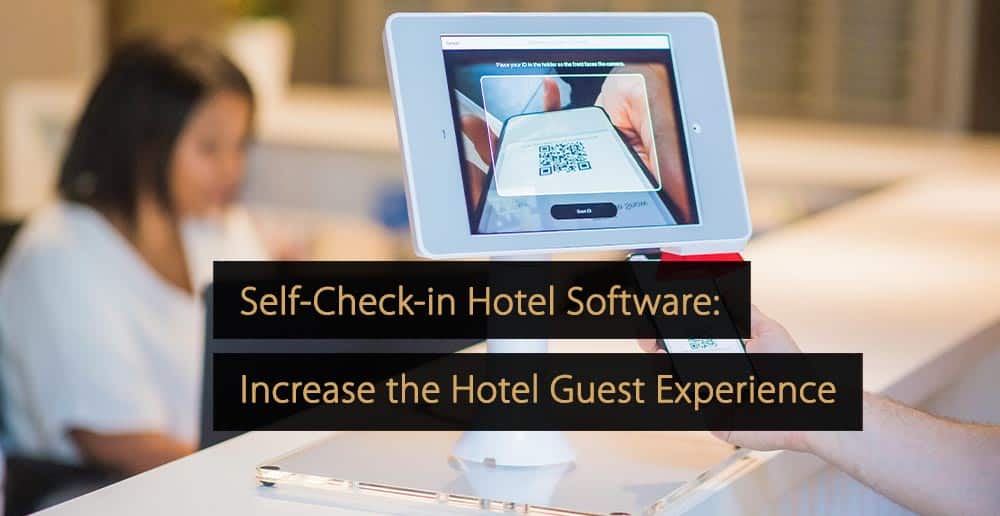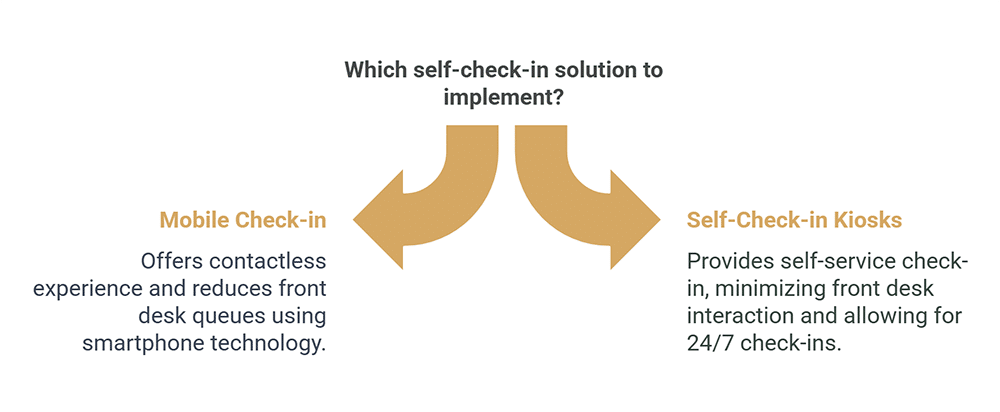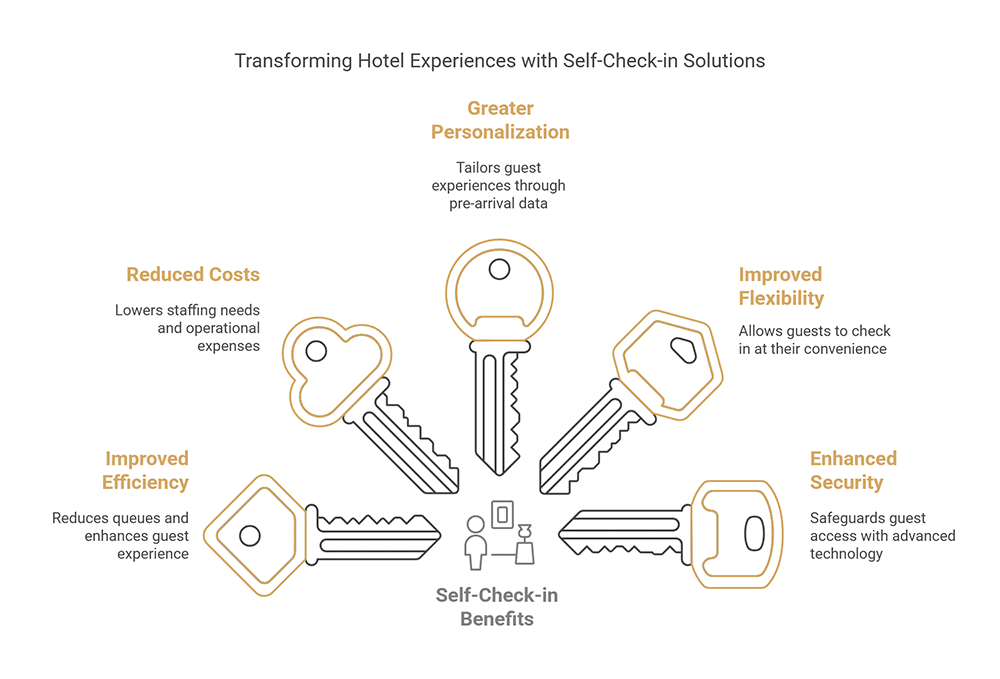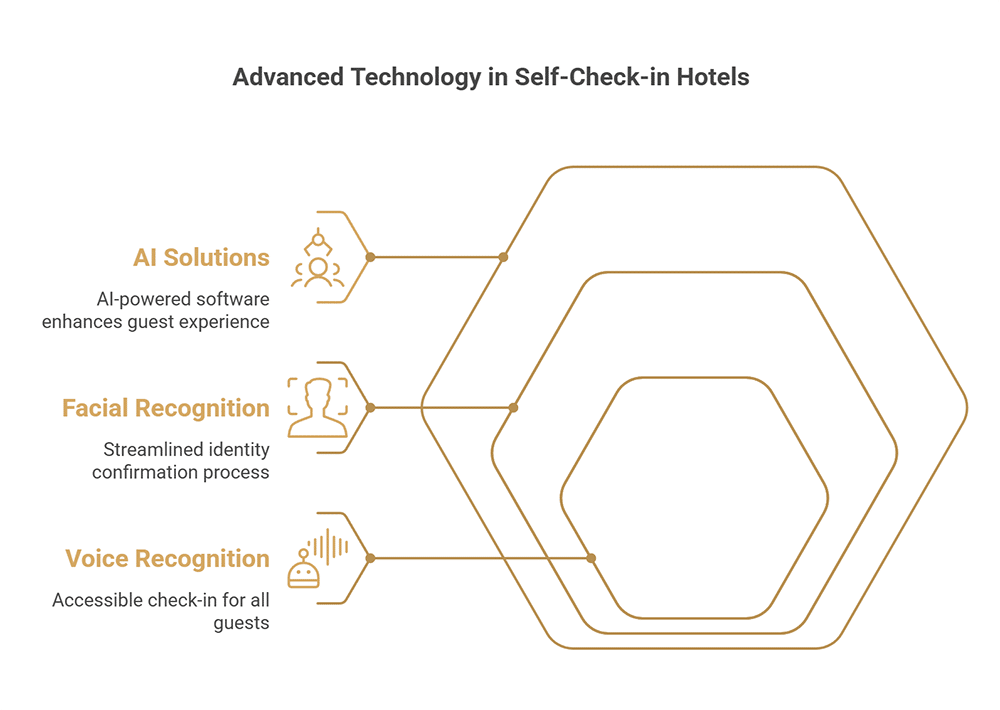Self-check-in hotel solutions can help to improve the guest experience within hotels, while also making life easier for your front desk employees. In this article, you can learn all about self-check-in hotel technology, explore the different options available, gain an appreciation of the benefits and find out about the most advanced options.
Table of Contents:
- What is the Hotel Industry?
- Why is Focusing on the Hotel Guest Experience Important?
- What is Self-Check-in Hotel Software?
- Self-Check-in Hotel Solution Types
- 5 Benefits of Self-Check-in Hotel Operations
- Self-Check-in Hotel Software Examples
- Advanced Technology in Self-Check-in Hotel Software
- Exploring Hotel Technology Options
- Understanding Hotel Door Lock Systems
What is the Hotel Industry?
Self-check-in hotel software forms a significant part of the modern hotel industry, but what is this industry, and how is it defined? The easiest way to think of it is as the section of the service industry that focuses on providing temporary guest accommodation and related services to travelers who are willing to pay for these things.
In this context, it is best to think of the word hotel meaning any form of accommodation that offers short-term, overnight stays to paying guests. While conventional hotels are a major part of the industry, this industry also includes other types of accommodation, such as resorts, bed and breakfasts, inns, motels and hostels.
In the “Hotel Industry: Everything You Need to Know About Hotels!” article, you can dive deeper into this definition, explore the different types of accommodation, find out about how hotel star ratings work and much more.
Why is Focusing on the Hotel Guest Experience Important?
For any hotel business, the guest experience on offer can be the difference between success and failure. Ultimately, guests are going to judge a hotel by factors that are relevant to the guest experience, like the level of service provided, how easy it was to check in and out, the standard of room provided to them and how the hotel made them feel.
Hotels also largely live and die based on their reputation. A large number of customers search for hotels online and then actively seek out reviews. The better the guest experience you provide, the better these reviews will be. This means that providing a great experience can help to attract more guests.
In other words, providing a high-quality guest experience can form a crucial part of a hotel marketing strategy. It is one of the best ways to stand out from rival hotels and gain a competitive edge. For this reason, in addition to focusing on the guest experience with features like self-check-in hotel solutions, you should also encourage guest reviews.
What is Self-Check-in Hotel Software?
Self-check-in hotel solutions, also known as contactless check-ins, are designed to speed up the check-in process within hotels, making the entire experience smoother for customers, while also making the workload easier for employees. This is generally achieved by asking guests to provide information traditionally gathered by the front desk.
Such a system can take several forms, with examples including sending a pre-arrival email to guests after they book a room, or implementing self-service kiosks within the hotel lobby. Either way, guests provide the most important information electronically and they then receive instructions and important information electronically too. This might include information on hotel policies, hotel Wi-Fi passwords and other valuable information.
Depending on the way your hotel is set up, this will either mean that guests only need to visit the front desk to receive their room key, or a member of staff will be alerted to the guest’s presence and will deliver their key to them. Some more advanced self-check-in hotel operations even use digital keys, which can be sent to a smartphone.
Self-Check-in Hotel Solution Types
Over time, two main self-check-in hotel solutions have emerged as the most popular types:
Mobile Check-in
A mobile self-check-in hotel solution will typically make use of a dedicated hotel app, although the process can also be carried out via email. Either way, the idea is to ensure hotel guests can book their hotel room and complete the check-in process from their smartphone, reducing queues at the front desk and allowing for faster check-ins.
Various systems are used by hotels around the world, including using QR code scanning to notify the front desk when a guest arrives, so that a key can be provided. However, an increasingly common technology involves using the mobile app as a hotel room key. When this is in place, the entire check-in process can become completely contactless.
Self-Check-in Kiosks
The idea behind a self-check-in hotel kiosk is to allow guests to check themselves into a hotel room without visiting the front desk. Instead, when a guest arrives at the hotel, they visit one of the self-service kiosks, enter their information, and then alert hotel staff, who can then attend to them, carry their bags and provide a room key.
Many of these systems work by requesting that guests provide the most important information in advance so that the self-check-in process is swift. For hotels, this system prevents queues from forming at the front desk and allows interactions to be kept short and sweet. For customers, it means check-ins are smooth and simple on a 24/7 basis.
5 Benefits of Self-Check-in Hotel Operations
In the sections that follow, you can explore the key benefits of implementing self-check-in hotel solutions.
Video: Touchless Check-In at Hilton Norfolk THE MAIN
1. Improved Efficiency
Self-check-in hotel solutions offer hoteliers and customers alike the benefit of improved efficiency. In particular, the use of mobile check-ins or self-service kiosks can reduce or eliminate queues at the front desk. This not only makes check-ins easier for hotel staff to manage, but it also prevents delays for guests upon arrival.
Improvements to efficiency can have a significant bearing on guests’ perceptions of their experience in the hotel, because it creates a positive first impression. It can also potentially have knock-on effects for other hotel departments, allowing staff resources to be redirected away from front desk operations, towards other areas.
2. Reduced Costs
Another major benefit associated with self-check-in hotel software is its ability to help hotels reduce some of the traditional front desk costs. This is primarily achieved through reducing the workload for staff, meaning fewer front desk employees will need to be working at any given time.
This can have a positive impact on your hotel’s bottom line. You then also have the option to redirect these additional funds to other areas, such as hotel maintenance and upkeep, or your hotel’s facilities.
3. Greater Personalization
One of the key features of self-check-in hotel solutions is the acquisition of customer data before each guest arrives. This is often achieved through a mobile app, or by sending an email and asking the customer for relevant information. When this data is used effectively, self-check-in offerings can provide greater personalization.
Examples could include asking for a guest’s preferences in advance and preparing their room accordingly. This could consist of adjusting the temperature in the room, stocking the fridge with requested items and more. Greater personalization helps guests to feel appreciated and like they are being treated as an individual.
4. Improved Flexibility
For guests, one of the single biggest advantages of staying in accommodation that makes use of self-check-in hotel software is the enhanced flexibility provided. Flexibility is especially relevant when it comes to check-in times.
With traditional check-in processes, check-ins may need to occur during a specific time window, or it could result in more limited service overnight. However, with a self-check-in system, there is greater freedom in terms of when a check-in should occur. This allows guests to arrive at a time that is most convenient for them.
5. Enhanced Hotel Security
For any hotel owner, security is a major concern, and a high-quality self-check-in hotel solution can assist with this. A mobile keycard system allows hotel guests to quickly and easily gain access to their rooms and also eliminates the need for a physical keycard. This, in turn, avoids situations where hotel keys are lost or stolen.
The two-way email communication involved helps to reassure hotels and guests that correct procedures will be followed. In more advanced self-check-in setups, facial recognition technology can potentially make check-ins more secure and ensure that access to the hotel is restricted to those who are actually supposed to be there.
Self-Check-in Hotel Software Examples
In this section, you can explore the most common examples of self-check-in hotel software:
Dedicated Mobile Apps for Hotels
The prevalence of smartphones has made dedicated hotel apps commonplace in the modern hotel industry. A hotel app can be used to assist with the self-check-in hotel experience, but hotel apps can also be used for check-outs, room service, guest communication, restaurant reservations, payments and much more.
In the “Hotel App: Optimize Your Guest Communication, Experience & Revenue” article, you can learn about hotel apps and their emergence, as well as the key reasons why you should invest in a high-quality app of your own.
Hotel Property Management System with Check-in Integration
Property management systems are comprehensive software tools, which facilitate effective management of a hotel. This includes tracking key performance metrics and managing bookings. Many of the best PMS solutions also feature self-check-in hotel features, helping to facilitate a smoother arrival process for guests.
In the “Essential Tips to Choose the Right Property Management System” article, you will be able to learn more about property management systems and find out how to choose between the different options on the market.
Advanced Technology in Self-Check-in Hotel Software
As self-check-in hotel solutions become more widespread, more advanced processes have emerged. Depending on your budget or hotel financing options, you may be able to make use of the following advanced technology:
Artificial Intelligence
Artificial intelligence can be used as part of self-check-in hotel solutions in a number of ways. AI-powered software can be deployed to automatically send information to guests and respond to questions or queries. AI can also be used to provide a greater degree of personalization and to recommend upgrades, trips and optional services.
AI can collect data, organize it and ensure employees are ready to deal with guests when they arrive, boosting efficiency. In the most advanced hotels around the world, robots are even being deployed for customer service purposes, and some of these hotels use AI-powered robots to assist with check-ins, housekeeping duties, and room service.
Video: Hotel Self Check-In/Check-Out Solution from Scala
Facial Recognition
One of the most time-consuming aspects of traditional hotel check-in processes involves providing documentation so that a guest can confirm their booking and identity. A possible way to circumvent this process and make it faster and more seamless is to make use of facial recognition technology in hotel lobbies, or on self-service kiosks.
Regardless of the specific self-check-in hotel solution you have in place, facial recognition technology could be used to verify who each guest is. Such a system could automatically alert front desk staff when a guest arrives, or automatically authenticate their arrival and provide app-based access to a mobile room key.
Voice Recognition
Voice recognition is a technology that many people are now familiar with, thanks to voice assistants like Alexa and Siri. This technology can also be deployed to assist with some of the basic customer service tasks that self-check-in hotel software necessitates. It could also be used for identity authentication.
Additionally, voice recognition can improve accessibility, making self-check-in options available to guests who may be visually impaired or otherwise unable to use self-service kiosks to complete the check-in process. Guests could also use a voice assistant to ask for tailored recommendations or to request assistance from a human employee.
Exploring Hotel Technology Options
Hotel technology is a key area to focus on, assisting employees with core tasks, making stays more pleasant for guests and generally improving the way a hotel operates. While self-check-in hotel software is a great example of such technology, there are many other examples too, from hotel chatbots and AI, to virtual and augmented reality.
In the “Hotel Technology Trends: 20 Upcoming Innovations You Must Know” article, you can read about the most significant technology trends disrupting the industry and learn why technology is becoming more important.
Understanding Hotel Door Lock Systems
Self-check-in hotel solutions form a major part of the guest experience, but it is worth noting that hotel door locks also help to determine how smooth this experience actually is. There are a wide range of hotel lock options available, depending on the type of experience you want to provide and your hotel budget.
In the “Hotel Door Locks: The Main Lock System Types and Their Benefits” post, you can learn about mechanical locks, keycard systems, PIN code systems, and more. At the same time, you can also explore the rules and regulations surrounding locks, and read about the factors you will need to consider before deciding on your door-locking system.
Did You Like This Article about the Self-Check-in Hotel Software?
You might also be interested in the following articles:
- Hotel Check-in Timing and Process Explained
- Late Check-In Hotel Guide: Key Strategies for Hoteliers
- Early Check-in Hotels: Optimize the Guest Experience & Hotel Revenue
- Check Out Hotel Processes: Tips to Optimize Guest Check Outs
- Hotels with Late Check-Out: Why Improve Guest Satisfaction
Introducing self-check-in hotel solutions can be highly beneficial for those in hotel management positions, making the guest experience more efficient, while also reducing the workload for hotel staff. As technology evolves, more advanced solutions, including AI and facial recognition, could provide an added layer of security too.
More Tips to Grow Your Business
Revfine.com is the leading knowledge platform for the hospitality and travel industry. Professionals use our insights, strategies, and actionable tips to get inspired, optimize revenue, innovate processes, and improve customer experience.Explore expert advice on management, marketing, revenue management, operations, software, and technology in our dedicated Hotel, Hospitality, and Travel & Tourism categories.











Leave A Comment